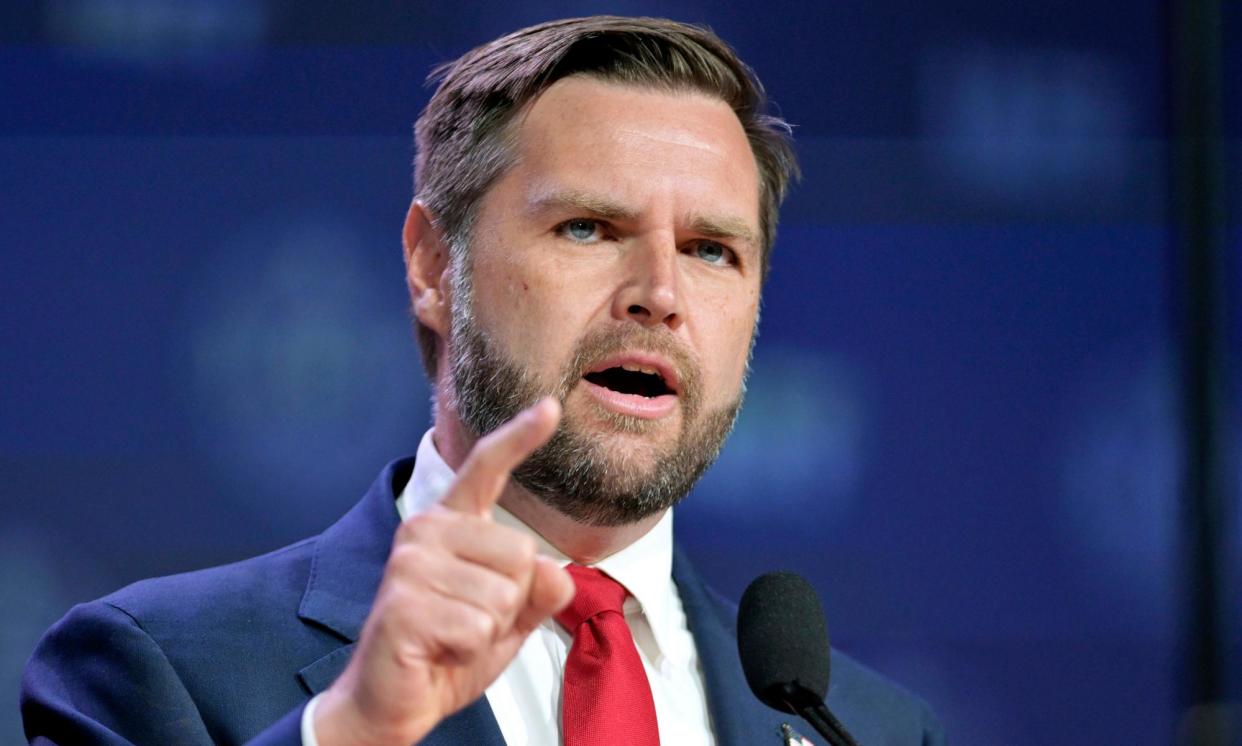JD Vance endorsed anti-IVF report that contradicts Trump’s new stance

A rightwing thinktank report proposing sweeping restrictions to abortions and fertility treatments was endorsed by JD Vance years before he became a fervent backer of Donald Trump and – eventually – his vice-presidential running mate known for his derisive views on childless women.
In 2017, months into Trump’s presidency, Vance wrote the foreword to the Index of Culture and Opportunity, a collection of essays by conservative authors for the Heritage Foundation that included ideas for encouraging women to have children earlier and promoting a resurgence of “traditional” family structure.
The essays lauded the increase in state laws restricting abortion rights and included arguments that the practice should become “unthinkable” in the US, a hardline posture the Democrats now say is the agenda of Trump and Vance, who they accuse of harbouring the intent to impose a national ban following a 2022 supreme court ruling overturning Roe v Wade and annulling the federal right to abort a pregnancy.
Related: Donald Trump is backing free IVF? You can practically smell the desperation | Arwa Mahdawi
The report also includes an essay lamenting the spread of in vitro fertilisation (IVF) and other fertility treatments, with the author attributing them as reasons for women delaying having children and prioritising higher education rather than starting families.
IVF has emerged as an issue in November’s presidential race after Trump said last week that he favoured it being covered by government funding or private health insurance companies – a stance seeming at odds with many Republicans, including Vance, who was one of 47 GOP senators to vote against a bill in June intended to expand access to the treatment.
The report’s contents provide fresh insights into the philosophy informing some of Vance’s inflammatory later public statements, which have included saying that America is run by “childless cat ladies” and that he is disturbed by the idea of teachers who do not have children.
He has also suggested that people without children are likely to become “more sociopathic”.
The 2017 report was released a year after the publication of Vance’s bestselling memoir, Hillbilly Elegy, and also after he had made a series of statements denouncing Trump, whom the US senator called “cultural heroin” and speculated could become “America’s Hitler”. He also described himself as “a never Trump guy”.
However, its foreword contains hints that Vance’s thoughts on the then president were already evolving.
“We all seem to be waking up to the fact that things are not quite what they used to be,” he wrote. “When president Trump has spoken of the country as trapped in a losing game of international trade or decried the carnage on so many American streets, he has earned criticism for painting an overly pessimistic view of his own country. Yet that pessimism struck a chord with many Americans.
“The question for those concerned about the future of the country is not whether negativity is justified, but why negativity inspired so many at the polls.”
Vance’s views ultimately went full circle, and Trump endorsed his successful election campaign for the US Senate in Ohio in 2022.
The foreword to the 2017 report also seems to be one of Vance’s first known links to the Heritage Foundation, a thinktank responsible for producing Project 2025, a controversial and radical blueprint for remaking US government and society in a conservative image. Trump has disowned the 922-page document. But the campaign of Kamala Harris, the Democratic presidential nominee, has depicted it as an assault on basic freedoms and typical of what lies in store under a second Trump presidency.
In a statement, Luke Schroeder, a spokesman for Vance, said the report’s contents did not necessarily reflect his views on IVF or other issues.
“Senator Vance has long made clear that he supports IVF and does not agree with every opinion in this seven-year-old report, which features a range of unique views from dozens of conservative thinkers,” Schroeder said. “He had no role in editing the report and outside of his own contribution, did not have any input on the commentary throughout.”
